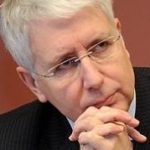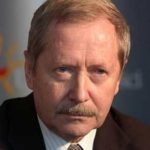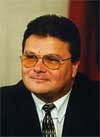
The article below is reprinted with the permission of the Project Syndicate.
Imants Viesturs Lieģis, former Defence Minister of Latvia
Linas Linkevicius, former Defence Minister of Lithuania
Janusz Onyszkiewicz. former Defence Minister of Poland, and Chair, Executive Council, Euro-Atlantic Association
RIGA/VILNIUS/WARSAW – In recent months, we have joined discussions led by former United States Senator Sam Nunn, former British Minister of Defense Lord Desmond Browne, and others to find a way to reduce nuclear weapons in Europe. Although we fully endorse the aim of working towards a world free of nuclear arms, we firmly believe that NATO must remain a nuclear alliance so long as these weapons continue to exist around the world.
At NATO’s summit in Chicago this month, determining the appropriate mix of conventional, nuclear, and missile-defense capabilities to ensure a reliable level of nuclear deterrence will undoubtedly be an important item on the agenda. But, even before those discussions take place, it is abundantly clear that there are a number of powerful reasons for maintaining NATO’s current mix of capabilities, including the presence of US nuclear weapons in Europe.
For starters, there remains an overwhelming disparity between the US and Russia on non-strategic nuclear weapons in Europe, with roughly 200 for the former and an estimated 2,000 for the latter. Every effort must be made to reduce these numbers, but only by reciprocal measures.
Indeed, there are serious doubts that unilateral withdrawals by NATO would encourage Russian President Vladimir Putin to review his country’s deepening reliance on nuclear deterrence. Given that our countries are very close to Russia’s deployed nuclear arsenal, an increasing nuclear disparity between NATO and Russia resulting from NATO reductions would be of paramount concern to our fellow citizens.
That ongoing disparity should and must remain a concern for NATO as a whole. Let us not forget that, only a few years ago, Russia and Belarus conducted joint military exercises according to a scenario that included a nuclear attack on Poland.
Second, it seems unlikely that there will be much progress in talks with Russia on reducing tactical nuclear weapons in the near future, and certainly not until after November’s presidential election in the US. We regret this. Our countries welcomed the ratification in 2011 of the New START agreement between the US and Russia – a positive outcome of US President Barack Obama’s policy towards Russia of reducing strategic nuclear weapons, and we hope that there will be no backtracking on this treaty.
But the fact is that there is no follow-on process in sight to make good on this goal. Moreover, missile-defense cooperation has stalled over fundamental differences in political approaches, and Putin has indicated that he will not attend the NATO-Russia summit in Chicago.
Nunn has rightly pointed out that US/NATO and Russian threat perceptions will never completely overlap. Yet a great number of the threats facing the two sides are increasingly shared and can often best be confronted together. For this reason, we need to continue to engage our Russian partners with patience, transparency, and a view to enhancing mutual trust and confidence.
Finally, reducing the presence of US tactical nuclear weapons in Europe would add to the concerns expressed by many European leaders about America’s long-term commitments to the continent. Thanks to US leadership, Poland, Latvia, Lithuania, and other European countries have enjoyed historically unsurpassed security since joining NATO, but that security should not be taken for granted.
All of the NATO allies must understand that the global security landscape is changing. Cyber threats and energy security have come to the fore. The situation in the Asia-Pacific region requires moving US troops who were once based in Europe to Australia. But we believe that the ongoing reductions of US conventional forces in Europe should not yet be compounded by any possible reduction in America’s nuclear capabilities there. This would weaken the transatlantic link that is essential for Europe’s security and NATO’s cohesion.
Nuclear disarmament needs to remain high on NATO’s agenda, but new and creative approaches are needed if disarmament is to enhance, rather than undermine, the Allies’ security. Only those approaches that ensure reciprocity, transparency, cohesion, and undiminished security for all of NATO’s members have a chance at success.
The opinions articulated above represent the views of the author(s), and do not necessarily reflect the position of the European Leadership Network or any of its members. The ELN’s aim is to encourage debates that will help develop Europe’s capacity to address the pressing foreign, defence, and security challenges of our time.




